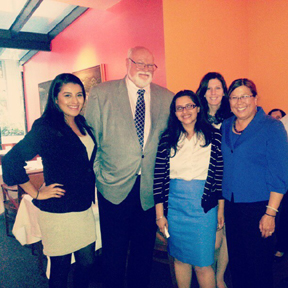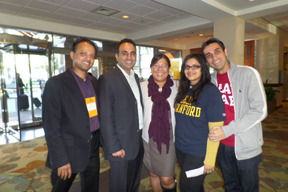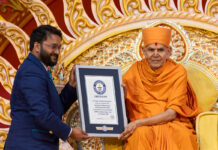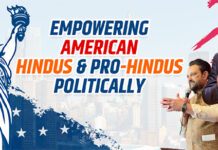With this monthly column, we intend raising political awareness and become an inspiration for each of us to excel, reach greater heights. We Indian Americans are going through a transitional evolution in this country, as we get entrenched in doing some good; as entrepreneurs, high tech geeks, doctors, lawyers, imposing our good will upon this fantastic country. But as we all discover, our involvement can run deeper and wider to impact issues near and dear to our hearts. It starts with simple contribution and involvement in our local community. There are few who are already beginning or have made their mark – we want to highlight these SatyAgrah souls as inspiration and learning for all of us.
We invite success stories you have observed around you, provide us your insights on Indian Americans heroes and heroines locally and nationally who made things happen. The ones who helped address a simple issue in the community to make life a bit better; perhaps got elected to the school board, appointed to the planning commission or library commission. The one common theme that you may discover, the experience is rewarding and transformative at the same time – there is value in being involved and being an engaged citizen. These perspectives will help construct roadmaps for our community to empower ourselves, to represent our local communities as leaders, and make this glorious country of America a better place. You can email your recommendations for this spotlight coverage to Rishi at RishiRishiKumar.com

Deepa Sharma is a rising third year law student at the University of California, Hastings. She has served as a Legal Extern for the Honorable Maria Rivera at the First District Court of Appeal and the U.S.
Department of Transportation. Prior to law school, she worked as a Legislative Aide to Senator Jim Beall, and served as his campaign manager on his Senate race in 2012. She also serves on the California Democratic Party’s Asian/Pacific Islander Caucus. Deepa completed her undergraduate studies at University of California, Berkeley, where she majored in Political Science.
Deepa, The road not traversed by many is never easy. What were some of the challenges along the way as you established yourself in public service as a minority woman? Where does the firepower come from?
I was always drawn to public service. As I explored my interests as a teenager, I had an amazing opportunity to serve as an intern in then-San Francisco Mayor Gavin Newsom’s office in 2004. In that position, I had a firsthand view of how people in leadership can make a huge difference in everyday people’s lives, particularly in the realm of civil rights. For example, gay marriage would not have been on the national radar without courageous decision-making. That lesson has always stayed with me, and showed me that the road less traveled is the most interesting.
I’d say the most challenging aspect is being a young person in this field: people are less apt to listen to your ideas because they are seen as being rooted in idealism rather than experience. But I learned that if you’re really committed and persistent, you will be heard.
You graduated from Berkeley and very soon you found yourself on a hot seat as the campaign manager for current Senator Jim Beall’s Senate run. How did that come about?
By the time the opportunity with Jim Beall came up, I had a lot of community experience. Throughout my undergraduate years, I pursued opportunities in state government and politics, which served me well after I graduated from Berkeley. I had the privilege of managing Anu Natarajan’s successful re-election bid to the Fremont City Council, and I worked in the state Legislature.
Most importantly, though, I was very fortunate to have been mentored by some of the smartest political strategists, like Katie Merrill. I felt prepared to lead Jim Beall’s Senate race because I learned from one of the best.
Winning Senator Beall’s race was truly an amazing experience. I’m so thankful to have had the opportunity to work for someone like Senator Beall.
You are very involved with the API Caucus. Do you see the Indian American community creating our own identity in politics or should we have the common Asian front? Do you see collaboration happening between us Indian Americans with the Chinese, Vietnamese, and Filipino population?
It’s an important debate that we are having right now. In one sense, the API community is not a monolithic bloc: there is so much diversity that gets overlooked because of the broad Asian/Pacific Islander label. And because of that, specific problems get overlooked as well. On the surface, a Bangladeshi-American person may not feel that they have a lot in common with someone of Korean heritage, and so, it can seem unfair that they would have to check the same box. But, the reality is that Indian-Americans only constitute approximately 3 million of the US population. If we stand united with the broader Asian/Pacific Islander community, our number increases to about 15 million. Together, we can indeed, be giant. I am optimistic that we can work together because ultimately, our issues are quite similar.
Our Indian American community has political strengths – financial power – and weakness – our voting record. What strengths and weaknesses do you see? How do we address the shortcomings?
Actually, I think the perception that Indian-Americans are financially powerful is a weakness. It isn’t entirely true, and contributes to the notion that Indian-Americans don’t have pressing issues that need to be addressed. Indian-Americans are deeply affected by issues like the costs of higher education, or even, the shortage in the housing supply, which is leading to the phenomenon we’re seeing today where an engineer has to spend close to half of his or her income on rent.
Although it’s true that as a whole, Indian Americans have the highest household median income, there was a recent study that came out showing that Indian-Americans needed to reach a higher level of educational attainment to reach positions of power than others. So, we can’t take it for granted that many people in our community are doing well, because there are struggles, too.
Another issue that I see is a lack of efficacy in the political process, generally, but I think that problem is certainly not unique to Indian Americans. The overall low turnout in the most recent elections is illustrative of that.
If you decided to make a run for a political office – when, why and how?
I am currently in law school, so I’m focused on my legal career. As I’ve gotten to learn more about the law, I have seen that there are many ways to make a positive difference. Holding political office is one way, but it isn’t the only one. For example, Vanita Gupta at the Department of Justice’s Civil Rights division, is leading the charge on police reform, which is quickly becoming one of the most important issues of our generation.

What can we as a community do to seed leadership with the next generation of Indian Americans? What are the few things you are focused on to make it happen
I would say that there hasn’t been an organized effort to build the pipeline of leadership in the Indian-American community. We need to ensure that our best and brightest are being mentored for community leadership positions. City or state-level commissions are a great starting point for leadership development, and can lead to larger opportunities. I would like to see a tighter-knit network of community-minded people get together regularly and learn from each other’s experiences.
Rishi is Silicon Valley’s energizer bunny deeply engaged in local causes to make his community a better place. He is an elected city councilmember in Saratoga, CA who continues to follow his passion for community service and community building. Rishi’s day job is as a Silicon Valley hi-tech executive but community service has become his passion. Rishi Kumar is also the founder of the Bay Area Indian American Democratic Club whose charter is to further the interests and values of Indian Americans, work towards political empowerment and advance ethical standards in the political system. You can reach him via his website www.RishiKumar.com.
Rishi would love to get your recommendations for coverage of engaged Indian American leaders who are trailblazers in the community. Email your recommendations to him at Rishi<at>RishiKumar.com
Rishi Kumar






